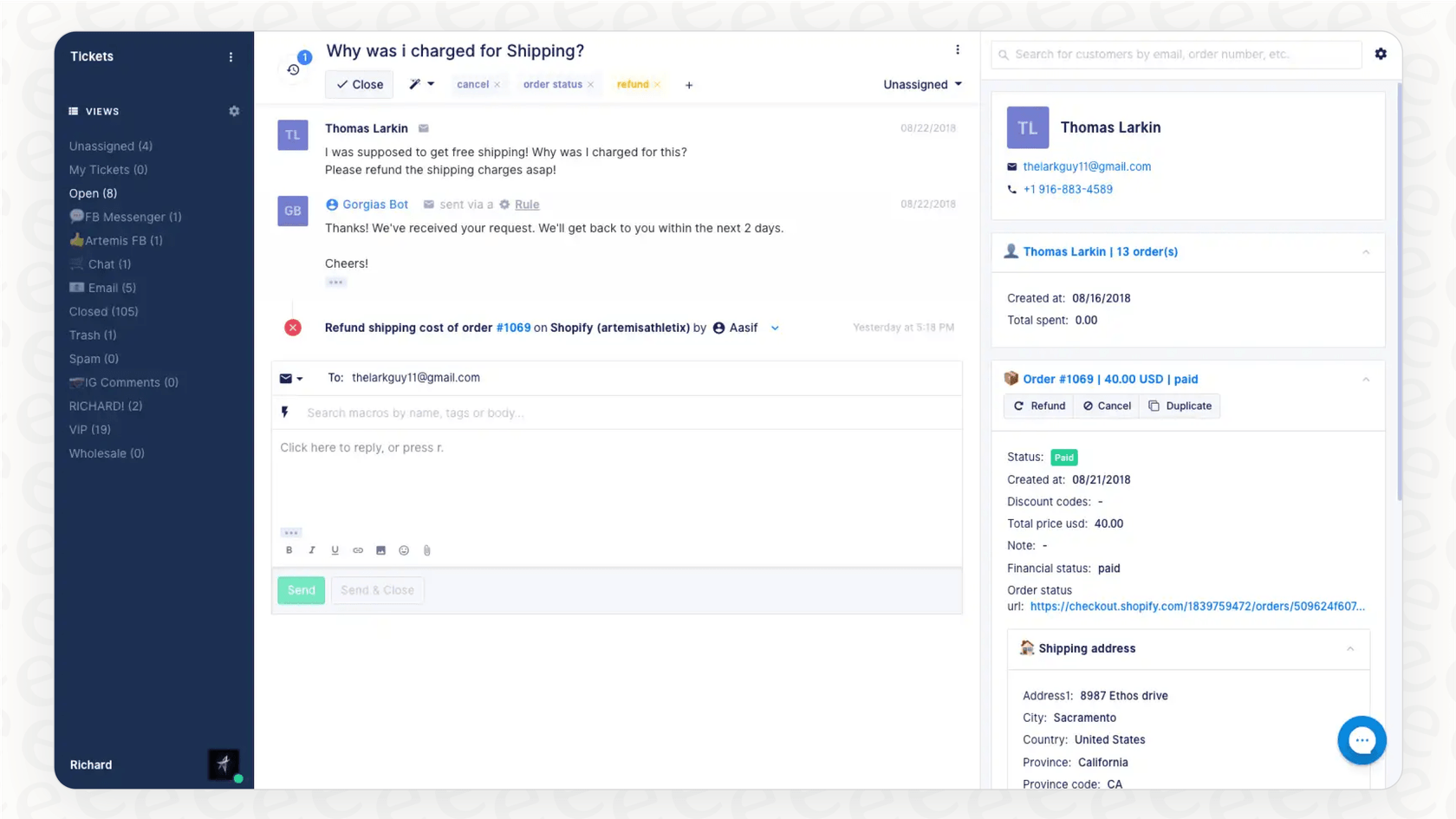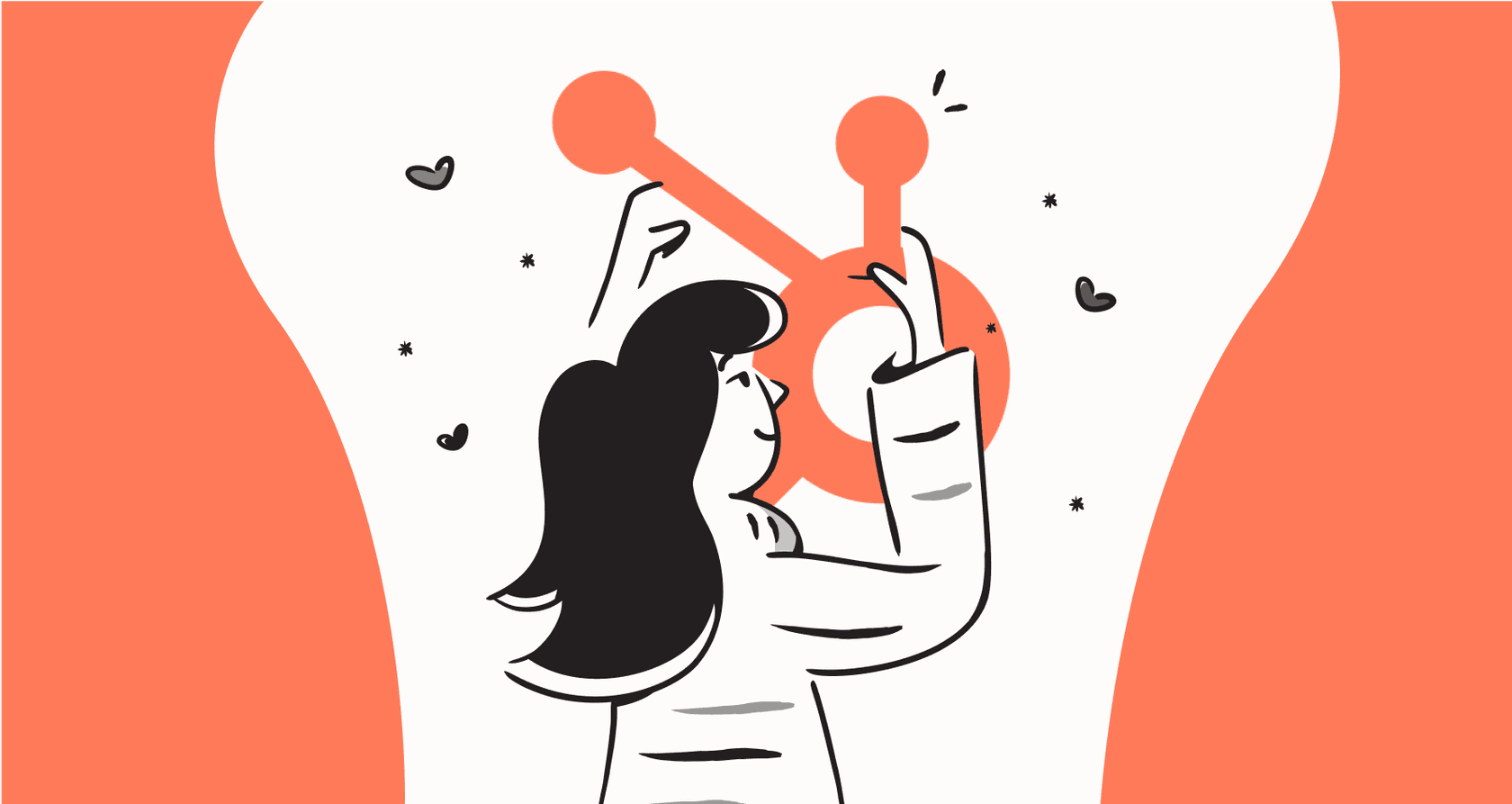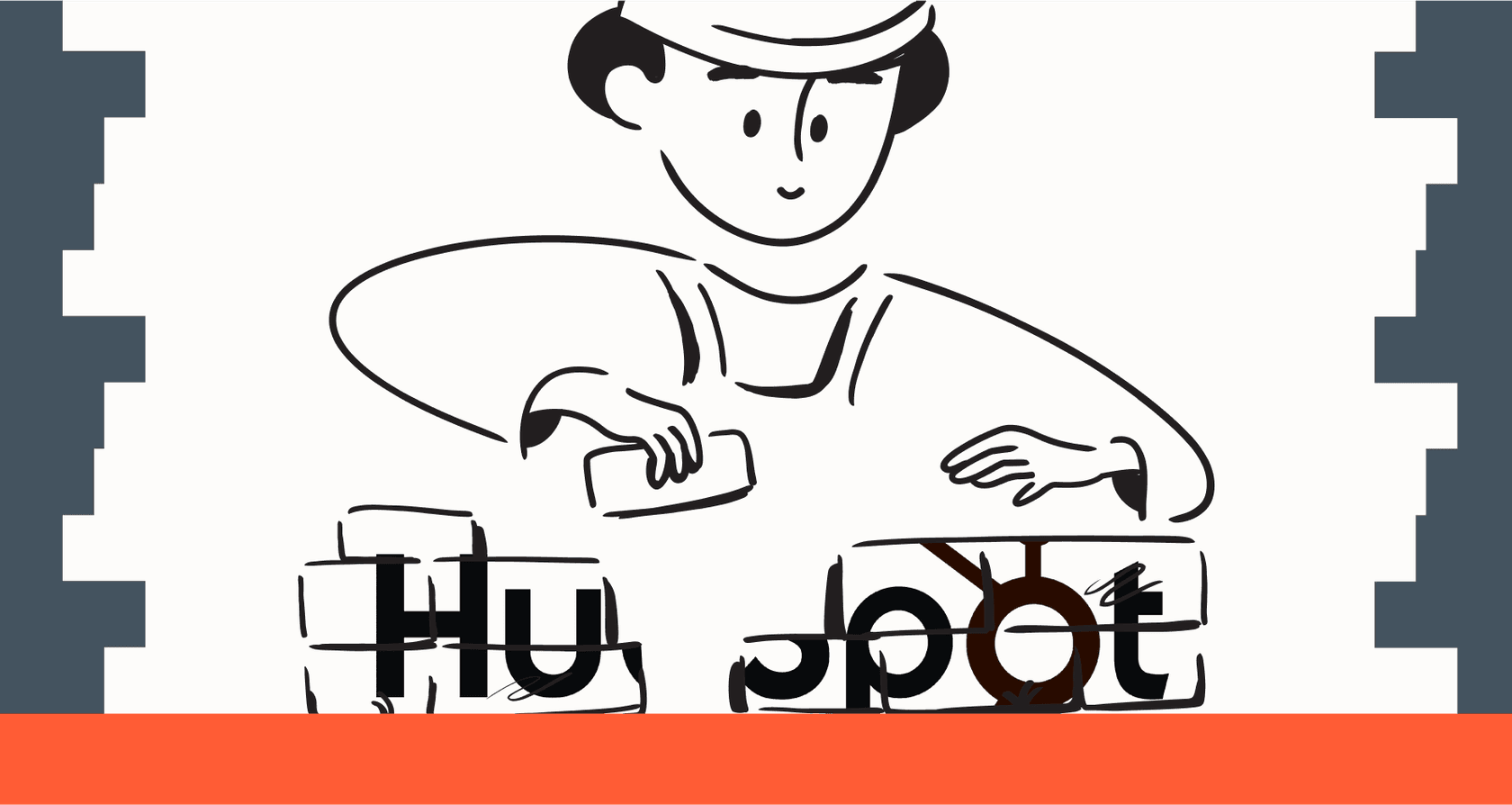Gorgias vs HubSpot: The complete integration & comparison guide (2026)

Stevia Putri

Stanley Nicholas
Last edited January 16, 2026
Expert Verified

Picking the right tools for customer support and sales can feel like a huge decision. You're often stuck juggling different platforms, with your team flipping between tabs just to get a full story on a single customer. Two names you’ll hear a lot are Gorgias and HubSpot Service Hub, but they're built to tackle different jobs.
This guide will lay it all out. We’ll walk through what each platform does, comparing features, pricing, and who they’re really for. We'll also get into the nuts and bolts of a Gorgias HubSpot integration for businesses that want the best of both worlds. By the end, you'll know which tool makes sense for you, or how to make them work together for a smoother customer experience in 2026.
What is Gorgias?
Gorgias is a customer service help desk designed specifically for e-commerce businesses. Its whole idea is to turn your support team from a cost center into a sales engine. It does this by plugging directly into the e-commerce world.
At its heart, Gorgias pulls all your customer conversations from email, chat, SMS, and social media into one dashboard. But what makes it special is its deep integration with platforms like Shopify, Magento, and BigCommerce. This connection means your support agents can see a customer’s full order history, shipping info, and past chats right next to their support ticket. Having that context right there is a massive help, letting agents solve problems faster and even spot opportunities to upsell.

Gorgias also uses AI and automation with macros and rules to handle those repetitive "Where is my order?" questions. This frees up your team to focus on trickier conversations that need a human touch. It’s pretty much the go-to for online stores that need a support tool that gets how they sell.
What is HubSpot Service Hub?
HubSpot Service Hub is a customer service tool, but it's just one part of the bigger HubSpot CRM platform, which covers marketing, sales, and content, too. Its biggest advantage is how everything is connected.
While Gorgias is all about e-commerce, Service Hub aims to give you a complete 360-degree view of a customer's entire journey. It offers a broad set of tools, including a solid ticketing system, a shared inbox for your team, and a self-service knowledge base builder. It also has built-in tools for gathering customer feedback, like Net Promoter Score (NPS) and Customer Satisfaction (CSAT) surveys.
Since it's built into the HubSpot CRM, your support team can see every single touchpoint a customer has had with your company, from the first marketing email they opened to their most recent sales call. This makes it a great fit for a lot of industries outside of e-commerce, like B2B, SaaS, and professional services. If you’re already using (or planning to use) the HubSpot ecosystem to manage your whole customer lifecycle, this is probably the tool for you.
Gorgias HubSpot feature comparison
Both platforms want to make customers happy, but they take different routes to get there. The right choice really comes down to what your business needs most: a specialized e-commerce tool or an all-in-one CRM.
| Feature | Gorgias | HubSpot Service Hub |
|---|---|---|
| Primary Focus | E-commerce Customer Support | All-in-One Customer Service & CRM |
| Key Strength | Deep Shopify/e-commerce data integration | Unified view of sales, marketing & service |
| Automation | AI for common e-commerce queries, rules, macros | Workflow automation across the full CRM |
| Knowledge Base | Basic help center functionality | Robust, built-in knowledge base creator |
| Integrations | 100+ e-commerce & support apps | Extensive HubSpot App Marketplace |
| Reporting | Tracks revenue generated by support | Tracks service metrics tied to overall CRM data |
Gorgias vs. HubSpot: Target audiences and use cases
You can see the difference pretty clearly in the table. Gorgias is made for direct-to-consumer (DTC) brands running on platforms like Shopify. Its features are all about helping agents close sales and solve shipping issues fast.
HubSpot Service Hub is for businesses that want their support team working hand-in-hand with sales and marketing inside one system. If your support agent needs to know if a customer is a hot lead or part of a big marketing campaign, HubSpot has the edge.
Gorgias vs. HubSpot: Automation and AI capabilities
Both platforms use automation, but they do it differently. Gorgias’s AI is trained to understand common e-commerce questions right away, like "How do I make a return?" It's practical and useful for online stores from day one. HubSpot’s automation is more about your internal processes. For example, you can create a workflow that automatically assigns any ticket with "billing" in the subject line to your finance team.
Both platforms offer powerful internal AI, though they focus on the data within their respective systems. Gorgias knows about your orders, and HubSpot knows about your marketing. To get automation that can give complete answers, you can use something that connects to all your company knowledge. An AI agent from eesel AI can plug into your help desk and pull info from other places like HubSpot, Google Docs, or Confluence to give more accurate answers.
Gorgias HubSpot integration: Why and how
So what happens if you're an e-commerce brand using Gorgias for support but HubSpot as your main CRM? This is a pretty common setup, and getting the two platforms to work together is a big deal.
Why set up a Gorgias HubSpot integration?
Connecting Gorgias and HubSpot gives you a single, reliable source for all your customer data. The idea is to get rid of the blind spots between your support, sales, and marketing teams. Here are a few reasons why it's worth it:
-
One view of the customer: Your support agents in Gorgias can see a customer's entire sales and marketing history from HubSpot. They’ll know if someone is a high-value lead or has an open deal, which helps them provide smarter, more personal support.
-
Simpler workflows: You can automate tasks that span both platforms. For instance, you could set up a workflow that automatically creates a new HubSpot contact when a new ticket comes into Gorgias, or updates a deal in HubSpot based on what was said in a support chat.
-
A better customer experience: When your teams have all the information they need, customers have a better time. They get faster, more helpful support because agents aren't scrambling to find information the company already has.
How to set up your Gorgias HubSpot integration
Connecting these two powerful platforms can be achieved through several effective methods. While they are distinct systems, HubSpot's flexible architecture and marketplace allow for various integration paths.
-
Third-party connectors: A popular way to connect Gorgias and HubSpot is with tools like Zapier, MESA, or Patchworks. These services use a trigger-and-action system. You could set up a workflow where the trigger is "New Ticket in Gorgias" and the action is "Create Contact in HubSpot." They're approachable to use and offer a bridge between your support and CRM data.
-
Custom HTTP integration: If you have developers on your team, Gorgias lets you build a custom HTTP integration. This gives you a lot more control to tailor the data flow exactly how your business needs it.
Another way to look at it is with a tool like eesel AI. Instead of building custom integrations, eesel AI connects to both Gorgias and HubSpot as knowledge sources. Your AI agent, working from your existing help desk, can then instantly find information in HubSpot to answer questions. This gives you the main benefit of an integration (access to all your data) plus the power of AI automation. Best of all, it takes one click to set up, and you can even simulate its performance on old tickets to see how it works.
Gorgias HubSpot pricing breakdown
Cost is always a factor, and Gorgias and HubSpot have different pricing models to match different team sizes and needs.
Gorgias pricing
Gorgias bases its pricing on the number of "billable tickets" or AI-automated chats your team handles each month.
-
Starter: $10/month for 50 tickets
-
Basic: $50/month for 300 tickets
-
Pro: $300/month for 2,000 tickets
-
Advanced: $750/month for 5,000 tickets
This model means costs scale based on your support volume. It’s a good fit for brands that want to pay based on their actual ticket activity.
HubSpot Service Hub pricing
HubSpot’s pricing is mostly based on users, meaning you pay per support agent (or "seat"). There's a limited free plan to get started, while the paid tiers offer more advanced features.
- Professional: Starts at around $150 per month, per seat.
This model offers clear predictability for teams as they scale their headcount. By leveraging the full HubSpot ecosystem, including Marketing and Sales Hubs, businesses can maximize the value of their investment to create a truly unified customer experience across the entire organization.
A more predictable alternative
In contrast, eesel AI's pricing is built to be simple and predictable.
eesel AI has straightforward plans based on a set number of monthly AI interactions, with no extra fees per ticket. This means your bill won't suddenly change after a busy month. All the main tools, like the AI Agent, Copilot, and Triage, are included in every plan. This predictable pricing lets you scale your support with confidence.
Which platform should you choose?
So, back to the big question: Gorgias or HubSpot? The real answer comes down to your business.
Gorgias is a strong choice for e-commerce stores that need a support platform that speaks their language. If you run on Shopify, it was built with your workflow in mind.
HubSpot Service Hub is the right call for businesses that want to take full advantage of the HubSpot ecosystem in 2026. If you want one mature, trusted place to manage marketing, sales, and service, it's the obvious pick.
For many companies, a Gorgias HubSpot integration is the ideal way to get the best of both worlds. The goal is to use all your data to power smart automation.
Instead of choosing one or the other, think about adding to the help desk you already have. eesel AI works with your current setup to bring all your knowledge together, from Gorgias, HubSpot, and anywhere else, to automate support and give your team a boost. You can get started in minutes and see exactly how much you can automate with a free trial.
Frequently asked questions
A Gorgias HubSpot integration provides a unified view of customer data across support, sales, and marketing teams. This eliminates blind spots and allows for more personalized customer interactions and streamlined workflows.
The most common methods involve using third-party connectors like Zapier or MESA, which create workflows based on triggers and actions. For more control, custom HTTP integrations can be built by developers to manage specific data requirements.
A key consideration is choosing the right integration method, as these platforms often require third-party tools or developer resources to connect. These methods allow businesses to shuttle essential data between systems to keep teams aligned.
Gorgias is best suited for e-commerce businesses, especially those on platforms like Shopify, due to its deep order and customer data integration. HubSpot Service Hub is ideal for businesses already within the HubSpot ecosystem, managing sales, marketing, and service from a central CRM.
While there is no direct, native integration built into either platform, HubSpot's extensive marketplace and flexible API allow businesses to easily connect the two systems using third-party integration platforms or custom development.
Gorgias prices based on billable tickets, meaning costs can fluctuate based on support volumes. HubSpot Service Hub, in contrast, uses a per-user (seat) model, which provides a predictable investment that scales as your team grows.
Instead of complex direct integrations, eesel AI connects to both Gorgias and HubSpot as knowledge sources. This allows an AI agent to access and leverage data from both platforms for comprehensive answers and automation, all with a simple setup.
Share this post

Article by
Stevia Putri
Stevia Putri is a marketing generalist at eesel AI, where she helps turn powerful AI tools into stories that resonate. She’s driven by curiosity, clarity, and the human side of technology.






